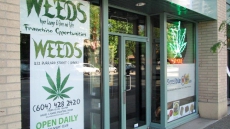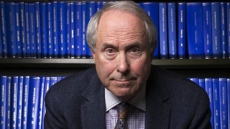MONTREAL — The advent of competition and new technologies is forcing politicians across Canada to re-evaluate their cities' taxi industries and to wonder just how many cabs they want on the roads.
Big cities are struggling with new entrants such as Uber, a service that allows drivers to work with little overhead costs and to undercut traditional cab fares.
Politicians in jurisdictions such as Toronto, Montreal, Vancouver and Edmonton are studying ways to modernize the taxi industry but while they come up with solutions, some cities are labelling Uber's services "illegal" and forcing police to seize its drivers' vehicles.
But not all the battles against the upstart have been successful: the City of Toronto recently lost a court case against Uber when a judge ruled there was no evidence the company was operating as a taxi broker or that it breached city bylaws.
Sunil Johal, policy director at the Mowat Centre, a public policy think-tank at the University of Toronto, says politicians should be thinking about the interest of citizens as opposed to ensuring traditional taxi drivers can earn a living under the current system.
He questions whether Canadian mayors have the wherewithal to tell the powerful taxi lobby that the days of making a living driving a taxi full time might be coming to an end.
"It's going to take courage," Johal said.
In Quebec — as in many other places in Canada — the government strictly regulates the number of taxi permits that are granted.
For instance, the island of Montreal can only have 4,522 permits. Notre-Dame-de-Pierreville, a town of 2,000 people about 130 kilometres from Montreal, is allowed two.
"The goal is to keep the revenues of the taxi drivers higher — that's it," said the Montreal Economic Institute's Vincent Geloso, who advocates deregulating the industry.
As a consequence of the limited number of permits, their price has soared to roughly $200,000 in Montreal, making its market worth roughly $900 million.
Permits are bought, sold, traded and rented on websites of companies such as Fintaxi, which provides loans to drivers in order for them to afford the permits.
The system worked for decades until companies like Uber came along. Uber drivers don't buy permits, have little overhead and use a mobile application to locate customers.
Johal says the solution is to end the limited taxi-permit system.
"If you have someone who has a car and is a safe driver and is properly insured, why don't they have the right to pick people up and drive them around?" he asked.

"If you (deregulate the industry) the market would sort itself out and people who couldn't make a living would stop doing it."
He is not optimistic such deregulation will happen because he believes it would result in the collapse of the taxi permit market across the country — a choice he said would be politically difficult to make.
"If a city announces it will phase in three times more licences in the next 10 years, then the licences will lose their value now," Johal said. "No one will buy at ($200,000) now because they know in (a few years) years it'll be worth $50,000."
But the devaluation of the market is already happening, according to Montreal cabbie Enamul Haque, who received a loan to buy his $230,000 permit five years ago and now says it's worth about $170,000.
"I'm losing money on my investment," Haque said. "I'm losing my business."
He says his costs include the permit loan, fees for the dispatcher, fees to the taxi bureau, a special driver's licence as well as gasoline.
"I work 12 hours a day, seven days a week," he said. "And I am still struggling to survive. I'm earning less than people who are washing dishes in restaurants. Can you imagine that?"
Marc Andre Way, president of the Canadian Taxi Association, argues limits on the number of permits are important.
"You don't want a Wild, Wild West type of environment where everyone can drive people around because then no one can make a career out of it," he said.
The permits in the industry have a value, he said, and "it's an inherited value and it's been around for decades."
"Many of us have invested in them and consider them assets," he added.
But many taxi drivers aren't lucky enough to have those kinds of assets.
Bazzi Bassam pays $440 a week to rent his permit and says he works about 70 hours a week driving people around Montreal.
His colleague, George Ene, also rents a permit for about the same amount and said he works 11 hours a day, five days a week.
"I'm making about 45 per cent less than when I started 19 years ago," he said.



